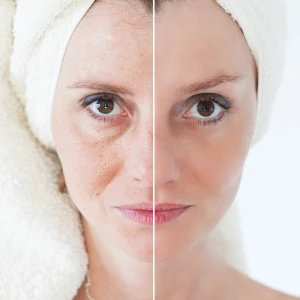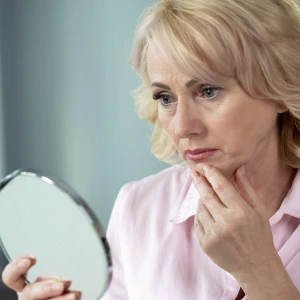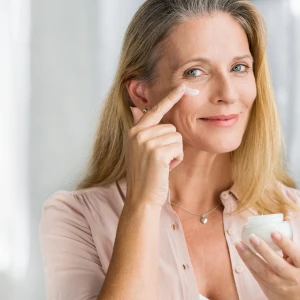Menopause is a natural biological process that marks the end of a woman's reproductive years. While it brings about various hormonal changes in the body, many women are unaware of how menopause can impact the health and appearance of their skin. Let's explore the effects of menopause on the skin and discuss practical tips for maintaining healthy and vibrant skin during this transitional phase of life.

1. Hormonal Imbalance
During menopause, the body experiences a decline in estrogen production, which can lead to hormonal imbalances. Estrogen plays a vital role in maintaining skin elasticity, moisture, and collagen production. The decrease in estrogen levels can result in a loss of skin elasticity and firmness, leading to the development of wrinkles, fine lines, and sagging skin.
2. Dryness and Thinning
Another common effect of menopause on the skin is increased dryness. With reduced estrogen, the skin produces fewer natural oils, leading to dry and itchy skin. Additionally, the skin may become thinner, making it more prone to damage and sensitivity.

3. Changes in Texture and Tone
Menopause can cause changes in skin texture and tone. Some women may experience a loss of radiance and a dull complexion due to decreased blood flow and collagen production. Uneven skin tone, hyperpigmentation, and age spots may also become more prominent during this time.
4. Increased Sensitivity
Many women notice an increase in skin sensitivity during menopause. The skin may become more reactive to environmental factors, such as sun exposure, harsh weather conditions, or certain skincare products. It is important to reassess skincare routines and opt for gentle, nourishing products to minimize irritation.

5. Acne and Breakouts
Contrary to popular belief, menopause can still trigger acne and breakouts. Fluctuating hormone levels can lead to an increase in sebum production, clogging pores and resulting in adult-onset acne. Adopting a skincare routine that addresses the signs of aging and acne-prone skin is essential.
Tips for Nurturing Healthy Skin during Menopause
1. Hydration: Drink plenty of water and use hydrating skincare products to combat dryness and maintain skin moisture.
2. Moisturizing: Apply a nourishing moisturizer daily to replenish lost hydration and improve skin elasticity.

3. Sun Protection: Shield your skin from harmful UV rays by wearing sunscreen with a broad spectrum SPF, along with hats and protective clothing.
4. Gentle Cleansing: Use mild, non-irritating cleansers that preserve the skin's natural moisture barrier and avoid harsh exfoliation.

5. Antioxidant-Rich Diet: Consume a diet rich in antioxidants, vitamins, and minerals to support skin health. Include fruits, vegetables, whole grains, and healthy fats.
6. Regular Exercise: Engage in regular physical activity to enhance blood circulation, promote healthy skin cell turnover, and maintain a youthful glow.

7. Skincare Routine: Tailor your skincare routine to address specific concerns, including anti-aging products, serums with collagen-boosting ingredients, and gentle exfoliation to promote cell renewal.
8. Consult a Dermatologist: If you're experiencing significant skin changes or have specific concerns, consult a dermatologist, who can provide personalized advice and recommend suitable treatments.
Menopause brings about significant changes in a woman's body, including the skin. Understanding the effects of menopause on the skin and implementing a holistic approach to skincare can help women maintain healthy, radiant skin during this transformative stage of life. By adopting good skin-care habits, nourishing the skin from within, and seeking professional guidance when needed, women can embrace the journey of menopause while feeling confident in their skin.
Find me on all Social Media Channels
@youngbodyandsoul


